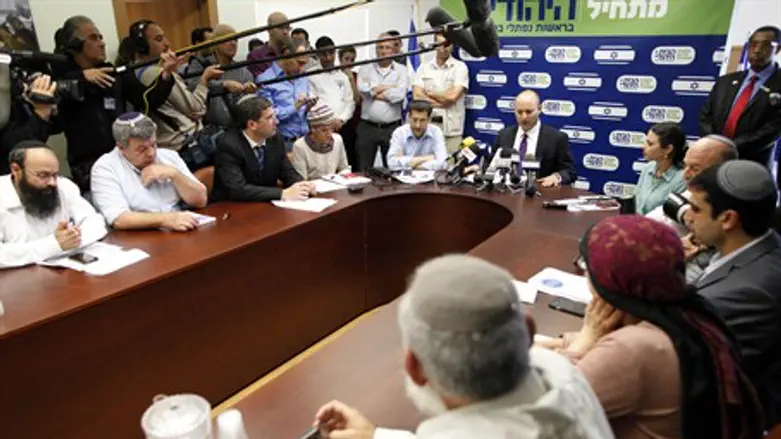
A poll conducted by the Panels Institute for the Knesset Channel shows a leap in the popularity of the religious Zionist Bayit Yehudi party – from 12 Knesset seats in real life to 19 in the poll, turning it into the second largest party in the Knesset.
The poll concentrates on the Bayit Yehudi party and its positions on various subjects.
According to the poll, if elections were to be held today, Likud / Yisrael Beytenu would receive a paltry 22 seats (down from the present 31), Yesh Atid 16 (from 19), Labor 15 (unchanged), Meretz 12 (double its present strength), while United Torah Judaism and Shas diminish their force to 4 seats each (down from 11 and 7, respectively), and Tzipi Livni's Hatnua receives 3 seats (down from 6).
It should be noted that assuming the Arab parties receive 10 seats, as in the present Knesset, these numbers do not add up to the required 120, but only to 105. It is not clear where the missing 15 seats are.
The poll's analysis sees a connection between the jump in Bayit Yehudi's popularity and the recent elections for the Chief Rabbinate, despite – or perhaps because – of the fact that the religious Zionist candidates did not succeed in those elections.
The poll reportedly also found that 72% of the public supports the idea being advanced by Bayit Yehudi Chairman Naftali Bennett, to appoint a single Chief Rabbi instead of the current two. Among religious people, 54.4% support the idea, while 82.3% of the secular people support it and 73.8% of the traditionalist (masorti) people support it.
On matters of diplomacy, the poll indicates that 63% of the public support Bayit Yehudi's position demanding a national referendum on any “peace deal” reached with the Palestinian Authority (PA). The party's opposition to a peace deal based on the 1949 armistice lines has the support of 69% of the public, while 57% do not believe in renewing negotiations with the PA, 58% oppose freezing construction in the Jewish communities of Judea and Samaria during diplomatic negotiations, 80% oppose freeing terrorists as a “gesture” for opening talks.
Sixty five precent of the public support the law for hareidi enlistment, which is being prepared for the final readings by MK Ayelet Shaked (Bayit Yehudi).